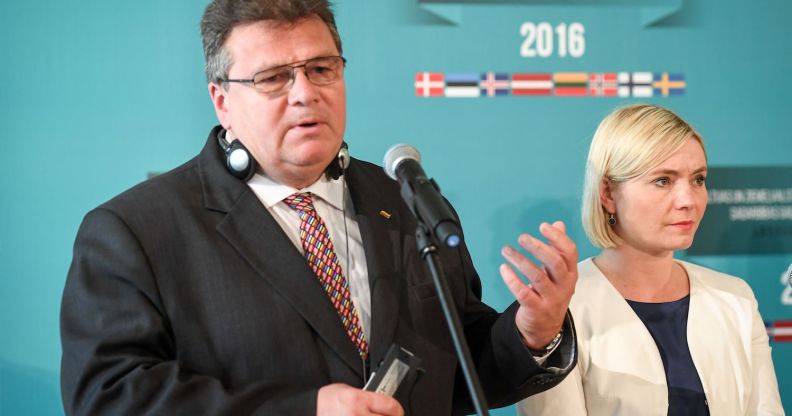Lithuania grants asylum to two gay and bi Chechens fleeing ‘gay genocide’

Lithuania’s Foreign Minister Linas Linkevicius (L) and Island’s Foreign Minister Lilja Alfredsdottir (R) give a press conference after the Baltic and Nordic Foreign Ministers meeting in Riga, Latvia, on August 26, 2016. / AFP / Ilmars ZNOTINS (Photo credit should read ILMARS ZNOTINS/AFP/Getty Images)
Lithuania is the first country to grant asylum to gay and bisexual Chechens fleeing the country due to a “gay genocide”.
The US has denied visas to those seeking asylum, and around 40 people have been forced to take refuge in other areas of Russia.
More than 100 people have been detained, tortured and, in at least three cases, killed during the ongoing purge of gay people in Chechnya.

Chechnya leader Ramzan Kadyrov said he would cooperate with Russian president Vladimir Putin’s investigation into reports of gay men being abducted, tortured and killed in the republic.
But two asylum seekers from Chechnya have been granted asylum in Lithuania, reports the Russian Interfax news agency.
Lithuania’s Foreign Minister Linas Linkevičius has confirmed that the two men have been granted asylum there after fleeing persecution in Russia.
He said that the Lithuanian Government had “issued visas to two people from Chechnya who were persecuted because of their sexual orientation”.
“We have consistently raised these issues both within the EU and in the parliamentary structures of the Council of Europe – regarding the possibility of helping and, if necessary, granting asylum,” he added.
Lithuania is one of the first EU nations to accept asylum seekers from Chechnya in response to the purge.
Many have asked why countries like the US are not doing more to take in those affected, despite calls for the purge to be investigated.
According to the Russian LGBT Network, around 40 gay and bi Chechens have taken to hiding in other areas in Russia as they are unable to secure visas to exit the country.
Some have left the country without visas.
The US State Department has declined to comment on why asylum seekers were being turned down for access to the US.
Earlier this week LGBT rights groups pleaded for the situation in Chechnya to be investigated.
Chechen Interior Minister Ruslan Alkhanov has told Russian publication Interfax that after conducting an investigation, he had found reports of a gay purge were “baseless and frivolous”.
He called the reports by Novaya Gazeta, whose journalist Elena Milashina was forced into hiding following the exposé, “hype inflated by individual … Chechen people”.
Alkhanov called Milashina’s reporting “provocative and intended to discredit the Chechen Republic in the public eye.”
He also signposted the ministry’s intention to sue Novaya Gazeta for its allegations, which have been verified by multiple human rights organisations.
Alkhanov’s leader, Kadyrov, said earlier this month that there had never been any gay men to persecute in the region, calling them “fake” Chechens
A Russian diplomatic official has previously claimed reports of a gay purge have been used as “a propaganda campaign against Russia around the world”.
Petition: Stop the persecution of gay men in Chechnya
Following the initial reports, it was revealed that Chechnya authorities are forcing gay men into concentration camps, sparking an outcry from LGBT and human rights activists across the world.
A number of stories from the region have been shared, including reports of parents of gay people who were issued a warning to kill their children before police killed them in torture camps.
Tanya Lokshina, from the Human Rights Watch, said that Chechen authorities had been conducting “extrajudicial executions, enforced disappearances, torture and cruel and degrading treatment” over the span of the last two decades.
Kadyrov has also pledged to “eliminate” the gay community in Chechnya by the start of Ramadan, according to British Foreign Officials.

Russia enforces a 2014 ‘gay propaganda’ law, which outlaws “propaganda of non-traditional sexual relationships” among minors.
The law also bans people sharing “distorted ideas about the equal social value of traditional and non-traditional sexual relationships”.
Authorities across Russia have exploited their powers to censor LGBT content online in the past, as well as in the media.
Lithuania’s Parliament also marked the International Day Against Homophobia, Transphobia and Biphobia this week.
Marked on May 17 around the world, IDAHOT raises awareness of persecution and hate crimes faced by lesbian, gay, bisexuals and transgender people around the world.
The day is heavily marked in countries that are already progressive on LGBT rights, but it is also making inroads in places where there is still a way to go on LGBT equality.
Lithuania has lagged behind on equality, with no legal recognition for same-sex couples, no gender recognition for transgender people, a ban on same-sex adoption, and generally negative social attitudes.

